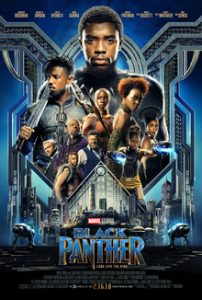Illiberal Hollywood: Kicked in its Pants by a Panther

[Graphic: Black Panther (2018) theatrical release poster, Walt Disney Studios distributor, Marvel Studios producer]
Hollywood has likewise been racist; though minorities make up nearly 40 percent of the U.S.’ population, minorities are poorly represented in front and behind the camera. As of 2013-14, only scripted broadcast television had seen any gains in diversity. Their numbers were stable or falling in nearly all other areas. In film alone, minorities were underrepresented by:
- Nearly 3 to 1 among film leads
- Nearly 3 to 1 among film directors
- Nearly 5 to 1 among film writers
(source: UCLA Bunche Center’s 2016 Hollywood Diversity Report (pdf))
Which is why this week’s release of Disney/Marvel Studios’ live action superhero film, Black Panther, has received so much attention. The director (Ryan Coogler), screen writer (Joe Robert Cole), and leads (Chadwick Boseman, Michael B. Jordan, Lupita Nyong’o) are all African American. This is a first for a film belonging to a major franchise (Marvel Studios), produced by a major studio, with a blockbuster-sized budget of $200 million. While there are a few roles played by white actors, they are small parts which exist to support the story — a complete inversion of racial representation typical across the majority of American films.
The film’s reception even before this week’s release was overwhelmingly ecstatic; many theaters sold out once online ticket sales were available. Reaction from viewers at advance press screenings were joyful, which sold even more tickets. Box office sales this weekend are expected to surpass the film’s budget.
Eager audience response offers a solid swat in the butt of Hollywood’s bigotry, which for too long has rejected scripts or denied minority-led/directed/written films adequate funding, saying, These films aren’t what audiences want. We’ve heard the same excuses about women-led/directed/written films, too, yet they often blow away expectations. Like Wonder Woman (female director and lead), which was the third highest grossing film last year at $412M; it would have placed higher except for the release of Star Wars: The Last Jedi (female lead) and long-awaited live action reboot of Beauty and the Beast (female lead).
Another refrain too often heard after a minority-led/directed/written film releases: This film exceeded expectations. Hollywood never sees this as a signal not that the film outperformed their forecasts but that audience demand is greater than films supplied. In other words, institutional racism thwarts normal free market response.
Black Panther has garnered some racist reactions, predictably from those who haven’t even seen the movie. DailyCaller’s EIC Ben Shapiro had one of the stupidest as well as most racist takes:
“‘Blade’ was not enough,” Shapiro quipped, referencing the 1998 film and subsequent two sequels that starred Wesley Snipes.
His rant lumped in Halle Berry’s appearance in Catwoman (2004) and Will Smith as lead in the Men in Black trilogy (1997, 2002, 2012), implying that African Americans should be content with what they have in film representation since they’ve been free for more than 200 years and assured their civil rights more than 50 years ago.
Never mind that his first example, Blade, though it featured Wesley Snipes as its lead was made in 1998 with a white director and writer and predominantly white cast. Ditto for the following two entries in the series, released in 2002 and 2004. Apparently black Americans shouldn’t expect to see a black lead in an action film more than once every couple of years — maybe once a year if they’re lucky.
If you’re white — and let’s face it, most of this site’s readers are — imagine a lifetime of rarely seeing anyone who looks like you in film, let alone TV. The idea that minorities, who make up such a large percentage of our population, should be satisfied with rarely ever seeing themselves in all manner of stories is repugnant. It’s both an economic and cultural apartheid. Or worse; it’s not a walling off but erasure of human beings.
It’s a pretty grotesque and deeply unaware stance coming from a guy with the family name Shapiro. It’s an insult to the writers who created Black Panther as a comic book character for Marvel — Jack Kirby and Stan Lee.
There are better criticisms of the film, and they come from those who are much better informed. WaPo’s Karen Attiah interviews Kenyan journalist and broadcaster Larry Madowo on the subject of Black Panther’s fictional fantasy representation of African culture and the ‘messed up’ relationship between Africans and African Americans. Critic Leslie Lee III takes issue with Black Panther’s politics. Warning: Both critiques are spoilery, with Lee’s feedback much more so. However, these critiques are educational for a white audience unfamiliar with African culture let alone African American culture.
Based on casual feedback from creative community and fandom members alike, Black Panther may be the top grossing film this year — and in spite of its release in February, typically the slowest time in the release calendar. It may crack the all-time top 20 films for box office ticket sales.
But will this finally be enough to get through to Hollywood’s other major and minor studios that their expectations need to be reset, that minority-led/directed/written films are successful and deserve a more proportional share of the film market?
In case you’re thinking of seeing Black Panther soon, here’s a decent primer. about its place in the Marvel Studios’ Avengers mythology. I’m not going this week; I’m going a couple weeks from now to an early Monday matinee when I might have 50 percent of the theater to myself so I can take notes. I don’t expect the theater to be less than half full before then.